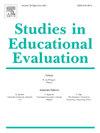Exploring the moderating role of well-being on the adaptive link between self-assessment practices and learning achievement
Abstract
Self-assessment practices can positively impact student learning and achievement. However, less is known about psychological moderators that can influence the impact that self-assessment practice may have on achievement. Integrating the dual processing self-regulation model and the self-assessment cycle framework, this study examined the role of students’ positive well-being in the link between self-assessment practices and domain-specific achievement scores. Hierarchical multiple regression analyses using data from 765 secondary school students revealed that self-assessment practices positively predicted achievement scores. Results also showed that positive well-being moderated the relationship between seeking internal feedback and self-reflection and achievement scores, in that the positive link between such self-assessment practices and achievement was stronger for students who had low or moderate well-being. These findings reinforce the impact of self-assessment on learning and add to the ecological validity of the dual processing self-regulation model. The discussion focuses on how these findings contribute to our understanding of how well-being could influence the adaptive role of internal and cognitive self-assessment practices in student learning. Limitations and future research directions are also discussed.

| 公司名称 | 产品信息 | 采购帮参考价格 |
|---|
 求助内容:
求助内容: 应助结果提醒方式:
应助结果提醒方式:


